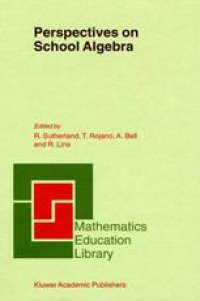
Ebook: Perspectives on School Algebra
- Tags: Mathematics Education, Learning & Instruction, Artificial Intelligence (incl. Robotics), History of Mathematics
- Series: Mathematics Education Library 22
- Year: 2002
- Publisher: Springer Netherlands
- Edition: 1
- Language: English
- pdf
This book confronts the issue of how young people can find a way into the world of algebra. The contributions represent multiple perspectives which include an analysis of situations in which algebra is an efficient problem-solving tool, the use of computer-based technologies, and a consideration of the historical evolution of algebra. The book emphasises the situated nature of algebraic activity as opposed to being concerned with identifying students' conceptions in isolation from problem-solving activity. The chapters emerged from a working group of the International Group for the Psychology of Mathematics Education. The authors are drawn from an international community and the work highlights the differences in school algebra around the world. The group invited Nicolas Balacheff to write a provocative postscript and he suggests that `there is no possible entrance to the world of algebra without a strong push or guidance from the teacher, because there is no natural passage from the problématique accessible from the child's world to the mathematical problématique'.
This book confronts the issue of how young people can find a way into the world of algebra. The contributions represent multiple perspectives which include an analysis of situations in which algebra is an efficient problem-solving tool, the use of computer-based technologies, and a consideration of the historical evolution of algebra. The book emphasises the situated nature of algebraic activity as opposed to being concerned with identifying students' conceptions in isolation from problem-solving activity. The chapters emerged from a working group of the International Group for the Psychology of Mathematics Education. The authors are drawn from an international community and the work highlights the differences in school algebra around the world. The group invited Nicolas Balacheff to write a provocative postscript and he suggests that `there is no possible entrance to the world of algebra without a strong push or guidance from the teacher, because there is no natural passage from the probl?matique accessible from the child's world to the mathematical probl?matique'.
This book confronts the issue of how young people can find a way into the world of algebra. The contributions represent multiple perspectives which include an analysis of situations in which algebra is an efficient problem-solving tool, the use of computer-based technologies, and a consideration of the historical evolution of algebra. The book emphasises the situated nature of algebraic activity as opposed to being concerned with identifying students' conceptions in isolation from problem-solving activity. The chapters emerged from a working group of the International Group for the Psychology of Mathematics Education. The authors are drawn from an international community and the work highlights the differences in school algebra around the world. The group invited Nicolas Balacheff to write a provocative postscript and he suggests that `there is no possible entrance to the world of algebra without a strong push or guidance from the teacher, because there is no natural passage from the probl?matique accessible from the child's world to the mathematical probl?matique'.
Content:
Front Matter....Pages i-vii
Approaches to Algebra....Pages 1-11
The Historical Origins of Algebraic Thinking....Pages 13-36
The Production of Meaning for Algebra: A Perspective Based on a Theoretical Model of Semantic Fields....Pages 37-60
A Model for Analysing Algebraic Processes of Thinking....Pages 61-81
The Structural Algebra Option Revisited....Pages 83-98
Transformation and Anticipation as Key Processes in Algebraic Problem Solving....Pages 99-119
Historical-Epistemological Analysis in Mathematics Education: Two Works in Didactics of Algebra....Pages 121-139
Curriculum Reform and Approaches to Algebra....Pages 141-153
Propositions Concerning the Resolution of Arithmetical-Algebraic Problems....Pages 155-176
Beyond Unknowns and Variables - Parameters and Dummy Variables in High School Algebra....Pages 177-189
From Arithmetic to Algebraic Thinking by Using a Spreadsheet....Pages 191-207
General Methods: A Way of Entering the World of Algebra....Pages 209-229
Reflections on the Role of the Computer in the Development of Algebraic Thinking....Pages 231-247
Symbolic Arithmetic vs Algebra the Core of a Didactical Dilemma....Pages 249-260
Back Matter....Pages 261-278
This book confronts the issue of how young people can find a way into the world of algebra. The contributions represent multiple perspectives which include an analysis of situations in which algebra is an efficient problem-solving tool, the use of computer-based technologies, and a consideration of the historical evolution of algebra. The book emphasises the situated nature of algebraic activity as opposed to being concerned with identifying students' conceptions in isolation from problem-solving activity. The chapters emerged from a working group of the International Group for the Psychology of Mathematics Education. The authors are drawn from an international community and the work highlights the differences in school algebra around the world. The group invited Nicolas Balacheff to write a provocative postscript and he suggests that `there is no possible entrance to the world of algebra without a strong push or guidance from the teacher, because there is no natural passage from the probl?matique accessible from the child's world to the mathematical probl?matique'.
Content:
Front Matter....Pages i-vii
Approaches to Algebra....Pages 1-11
The Historical Origins of Algebraic Thinking....Pages 13-36
The Production of Meaning for Algebra: A Perspective Based on a Theoretical Model of Semantic Fields....Pages 37-60
A Model for Analysing Algebraic Processes of Thinking....Pages 61-81
The Structural Algebra Option Revisited....Pages 83-98
Transformation and Anticipation as Key Processes in Algebraic Problem Solving....Pages 99-119
Historical-Epistemological Analysis in Mathematics Education: Two Works in Didactics of Algebra....Pages 121-139
Curriculum Reform and Approaches to Algebra....Pages 141-153
Propositions Concerning the Resolution of Arithmetical-Algebraic Problems....Pages 155-176
Beyond Unknowns and Variables - Parameters and Dummy Variables in High School Algebra....Pages 177-189
From Arithmetic to Algebraic Thinking by Using a Spreadsheet....Pages 191-207
General Methods: A Way of Entering the World of Algebra....Pages 209-229
Reflections on the Role of the Computer in the Development of Algebraic Thinking....Pages 231-247
Symbolic Arithmetic vs Algebra the Core of a Didactical Dilemma....Pages 249-260
Back Matter....Pages 261-278
....